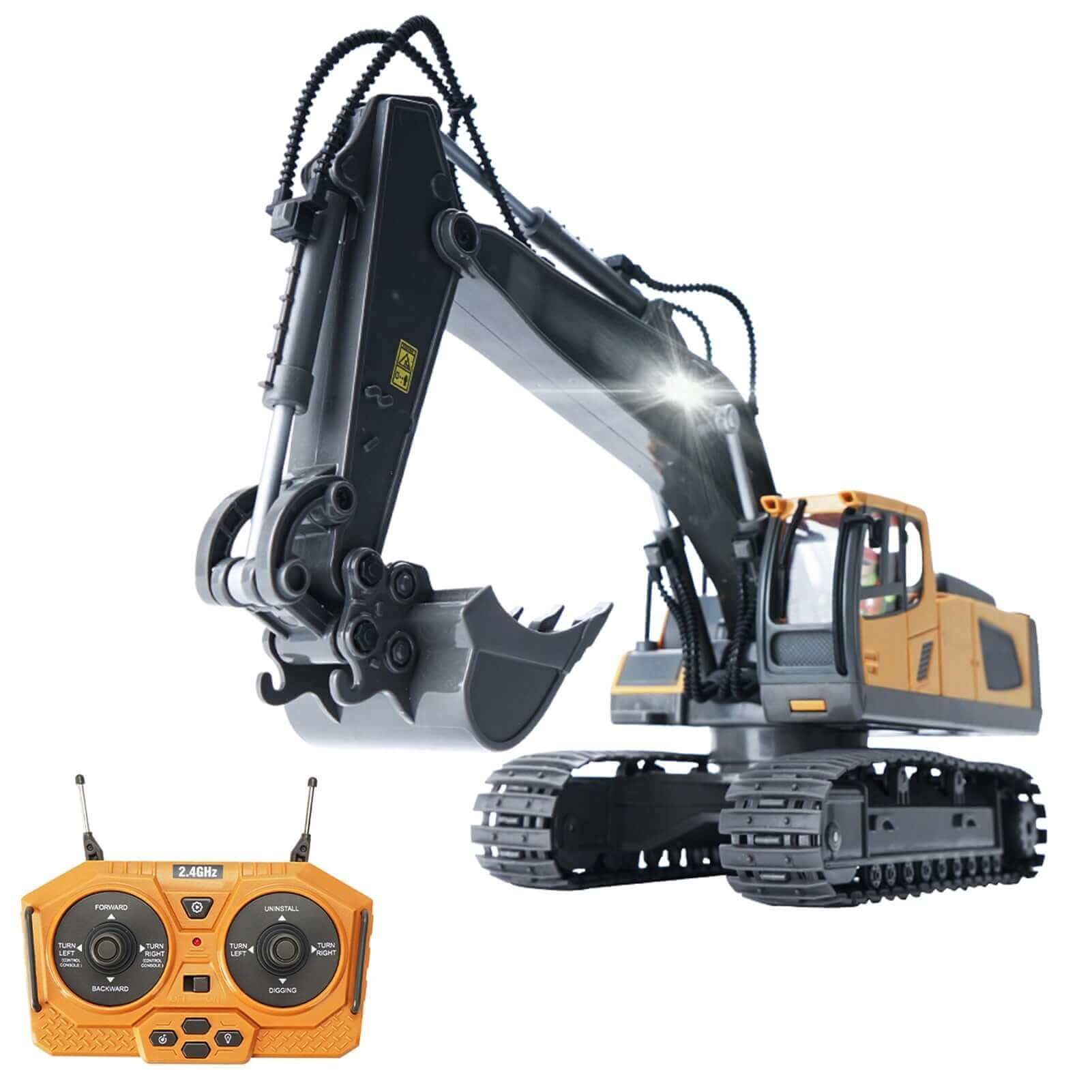Can a rc excavator Save You Time and Money? Here’s How
Wiki Article
Understanding How Excavator Functions and Its Effect on Effectiveness
Excavators play a necessary duty in building and construction and mining procedures, relying on an intricate interaction of hydraulic and mechanical systems. Their capacity to do a variety of jobs depends upon both their design and the innovation incorporated within. Understanding these components can substantially affect functional effectiveness and productivity. As developments remain to reshape the market, one should think about how these adjustments will certainly affect future techniques and performance.The Essentials of Excavator Mechanics

The Duty of Hydraulic Equipments in Excavators
At the heart of excavator procedure exists the hydraulic system, which plays a pivotal duty in powering the equipment's activities and functions. This system uses pressurized hydraulic fluid to transfer energy, enabling various actions such as lifting, moving, and excavating. By utilizing the principles of hydraulics, excavators can do jobs with exceptional accuracy and force, improving general functional efficiency.The hydraulic system contains key parts, consisting of shutoffs, pumps, and cyndrical tubes, which work together to control the circulation and instructions of the liquid. When the operator engages the controls, the hydraulic fluid is guided to certain cylinders, equating the operator's commands right into physical movement. This mechanism enables responsive and smooth actions, which are essential in building and construction and excavation settings. double e volvo rc excavator. The performance of the hydraulic system straight influences the efficiency and versatility of the excavator, making it a vital aspect in contemporary excavation proceduresKey Components of an Excavator
Comprehending the essential parts of an excavator is necessary for comprehending exactly how this effective device operates. An excavator is composed of several substantial components, including the undercarriage, home, arm, container, and boom. The undercarriage supplies security and wheelchair, frequently featuring wheels or tracks to navigate various surfaces. The home contains the engine and hydraulic systems, allowing the driver to regulate motion and power the equipment. The boom prolongs from the residence, allowing upright reach, while the arm links to the pail, helping with digging and training operations.Additionally, the taxi houses the driver, furnished with controls for accurate maneuvering. Each of these parts plays a crucial function in the excavator's overall functionality, adding to its performance and efficiency on construction websites. Comprehending these parts assists in maximizing and maintaining excavator efficiency, ensuring jobs are finished safely and properly.Add-on Adaptability and Its Benefits
Add-on versatility is a vital facet of excavators, allowing drivers to switch over in between numerous tools tailored for specific jobs. This versatility not only enhances job performance yet additionally adds to cost-effectiveness by minimizing the requirement for several devices. Recognizing the various sorts of attachments readily available can considerably influence the total efficiency and performance of an excavator on work sites.Sorts of Add-ons
While excavators are mainly acknowledged for their excavating abilities, their real convenience exists in the broad array of accessories available. These add-ons boost the excavator's capability, allowing it to carry out various tasks past excavation. Usual accessories include pails (for digging and scooping), hydraulic thumbs (for grasping products), and augers (for drilling openings) Grapples are used for dealing with and moving particles, while rippers can damage up hard surface areas. Various other specialized accessories, such as plates and plows, make it possible for excavators to adjust to certain job demands. This diversity not only enhances the machine's utility across various sectors, consisting of construction, landscape design, and demolition, but also allows operators to tailor their devices to meet details job needs effectively.Enhanced Work Performance
Maximizing task efficiency is a key benefit of making use of numerous excavator add-ons. Different accessories enable an excavator to do numerous tasks without requiring to switch over equipment, conserving important time and labor. Using a hydraulic hammer can damage concrete while a bucket accessory can dig deep into dirt, making it possible for a seamless process. This adaptability reduces downtime connected with equipment modifications and improves efficiency on-site. Furthermore, specialized add-ons improve precision in jobs such as grading or landscaping, leading to better outcomes. The capability to adjust to different task requirements not only simplifies procedures but additionally reduces the requirement for extra equipment, making sure that jobs are finished quickly and properly. In general, add-on flexibility considerably adds to increased work effectiveness in excavation job.Cost-Effectiveness and Convenience
Cost-effectiveness is a significant advantage of utilizing flexible excavator attachments. These accessories enable a solitary excavator to perform several jobs, reducing the need for extra machinery and labor - double e volvo rc excavator. By switching in between containers, hammers, and grapples, drivers can deal with different tasks, from excavating to demolition, therefore making best use of equipment YOURURL.com utilization. This flexibility not just lowers functional expenses but also reduces downtime associated with altering devices. Furthermore, the capacity to tailor excavators with specialized attachments boosts productivity, as they can efficiently deal with diverse tasks according to project demands. To end, the mix of cost-effectiveness and convenience in excavator accessories adds to enhanced functional effectiveness and resource allocation in building and excavation jobs
Advanced Modern Technology in Modern Excavators
Modern excavators are progressively outfitted with sophisticated modern technology that changes excavation procedures. my latest blog post Automation enhances procedures, while enhanced gas effectiveness minimizes functional costs. Furthermore, smart control systems boost accuracy and safety and security, noting a substantial evolution in excavation tools.Automation in Excavation Processes
As excavation technology progresses, automation has become an important component in boosting effectiveness and accuracy on work websites. Modern excavators are furnished with sophisticated automated systems that facilitate tasks such as grading, excavating, and trenching with minimal driver intervention. These systems use sensors, GPS, and machine learning formulas to ensure exact positioning and deepness control, significantly lowering the margin for error. Additionally, automation enables drivers to focus on calculated decision-making rather than hands-on controls, bring about improved efficiency generally. Such advancements not just enhance operations however additionally enhance safety and security by lessening human error in intricate operations. The integration of automation in excavation processes represents a substantial advancement in building innovation, driving the sector towards higher performance and effectiveness.Enhanced Fuel Performance
Advancements in innovation have actually likewise brought about considerable improvements in fuel effectiveness for modern excavators. Modern devices are furnished with innovative engines that optimize power output while decreasing gas consumption. These engines utilize ingenious combustion modern technologies, such as turbocharging and straight fuel injection, to enhance efficiency and efficiency. Additionally, light-weight products in construction decrease total weight, permitting much less power expense throughout operation. The intro of variable rate controls allows drivers to change engine performance according to certain tasks, better minimizing fuel use. As an outcome, these improvements not only lower functional prices however also add to ecological sustainability by lowering exhausts. Overall, improved fuel efficiency in excavators is an important development that boosts efficiency and economic stability in the building and construction sector.Smart Control Equipment
While drivers browse progressively complex task sites, smart control systems in excavators have emerged as important tools for improving efficiency and accuracy. These innovative technologies utilize algorithms and sensors to keep track of different parameters such as tons weight, surface conditions, and operational efficiency. By instantly readjusting hydraulic features, wise systems maximize device efficiency, bring about improved performance and lowered wear on components. In addition, operators profit from intuitive interfaces that give real-time comments and diagnostics, permitting for notified decision-making. This assimilation of innovation not only enhances operations however additionally decreases human error, adding to more secure workplace. As the building and construction industry remains to advance, smart control systems will play a crucial duty in shaping the future of excavator effectiveness and efficiency.Enhancing Operational Effectiveness With Excavators
Excavators play an essential role in improving functional performance throughout various construction and excavation tasks. Their versatility enables several jobs, including training, excavating, and product handling, which enhances operations and lowers the demand for added tools. With effective hydraulic systems, excavators can execute sturdy tasks with precision, considerably decreasing the moment required to total jobs. The combination of advanced modern technology, such as GPS and automated controls, further optimizes their operation, allowing operators to accomplish greater accuracy and lower material waste. Furthermore, contemporary excavators are developed site link to consume much less gas and lessen discharges, adding to both cost savings and environmental sustainability. By utilizing excavators effectively, building and construction groups can improve productivity, fulfill task deadlines, and enhance total site monitoring. This multifunctionality and effectiveness make excavators important devices in the contemporary building landscape.The Future of Excavators in Construction and Mining Industries
As the construction and mining markets progress, the future of excavators is positioned for considerable transformation driven by technical innovation and altering operational needs. Breakthroughs in automation and man-made knowledge are improving excavator abilities, permitting for improved precision and performance in operations. Autonomous excavators are arising, decreasing the requirement for human intervention and minimizing the danger of accidents.Moreover, the integration of telematics and IoT innovation enables real-time tracking of machine performance and anticipating maintenance, maximizing uptime. Environment-friendly styles, including hybrid and electric versions, are acquiring grip, aligning with sustainability objectives within the industry.Additionally, using advanced products and lighter layouts enhances gas efficiency while preserving efficiency requirements. As these patterns progression, excavators will play a crucial role in satisfying the boosting needs for productivity and security in construction and mining, eventually changing functional landscapes.Frequently Asked Questions
Just How Do Climate Condition Influence Excavator Efficiency?

Climate condition considerably influence excavator performance, as rainfall and mud can impede traction and security, while extreme temperature levels might impact hydraulic systems. Operators should adapt to these variables to assure suitable performance and safety during procedures.
What Precaution Should Operators Adhere To While Utilizing Excavators?
Security steps for excavator operators include using ideal individual safety tools, carrying out pre-operation examinations, making certain correct interaction with ground workers, maintaining a secure distance from above dangers, and sticking to well-known operational methods to stop accidents.Exactly How Frequently Should Excavators Be Maintained for Optimum Efficiency?
Excavators must be maintained regularly to ensure peak performance, normally every 250 operating hours or as specified by the supplier. Routine checks improve dependability, prevent unforeseen failures, and extend the life expectancy of the tools.
What Is the Average Life Expectancy of an Excavator?
The ordinary lifespan of an excavator usually ranges from 10,000 to 15,000 hours of operation. Aspects affecting longevity include upkeep techniques, running conditions, and the quality of the machine itself, influencing overall performance and efficiency.
Can Excavators Operate Uneven Surface Efficiently?
Excavators can run efficiently on irregular surface because of their verbalized designs and adjustable tracks. These functions enable them to keep security and grip, making it possible for effective procedure in difficult environments commonly experienced in construction and landscaping projects. Each of these components plays a crucial role in the excavator's general functionality, adding to its efficiency and effectiveness on building websites. Taking full advantage of work efficiency is a primary benefit of making use of numerous excavator attachments. While drivers navigate progressively complicated task sites, wise control systems in excavators have emerged as vital tools for boosting efficiency and accuracy. Excavators play an essential role in enhancing functional performance throughout different building and excavation tasks. Advances in automation and artificial knowledge are reshaping excavator capacities, allowing for boosted accuracy and performance in operations.Report this wiki page